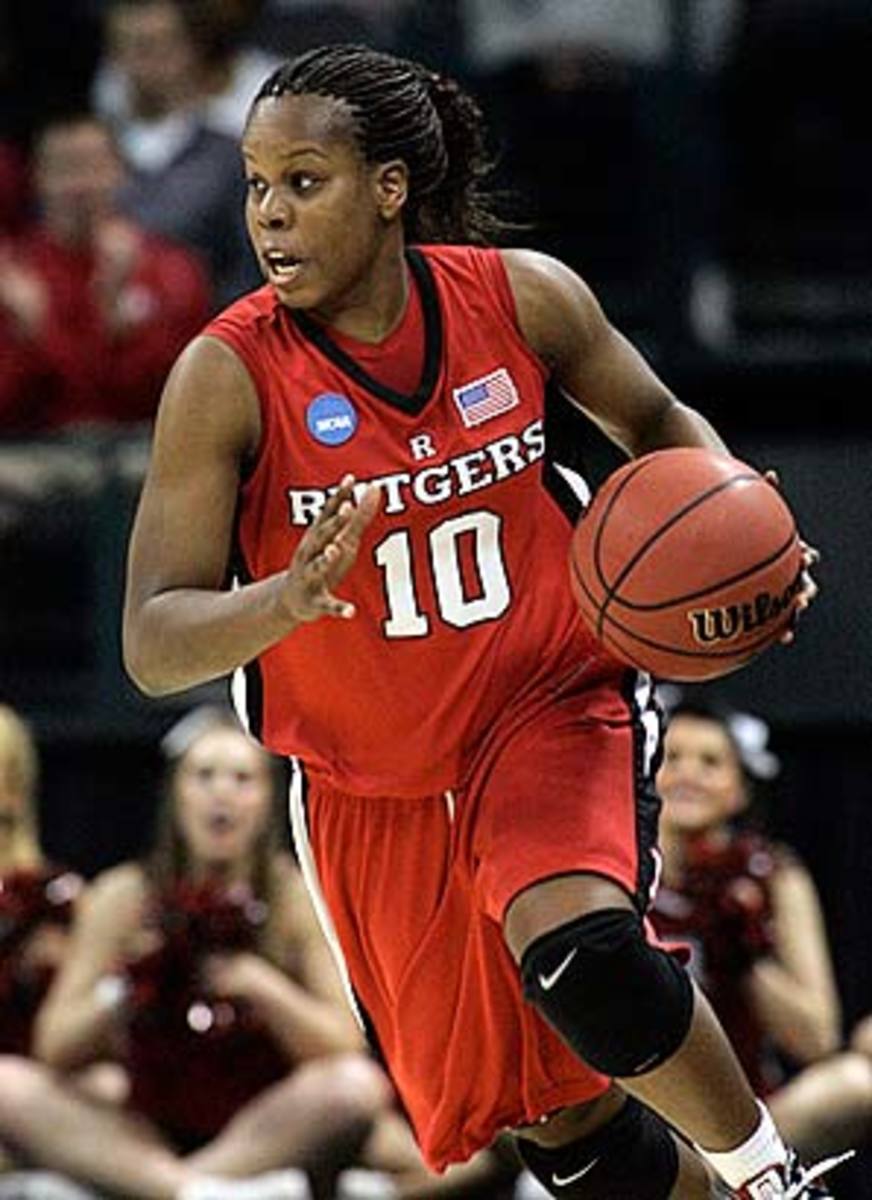Prince's decision to leave Rutgers early may be ill-advised
Rutgers junior Epiphanny Prince's plan to play overseas next season before entering the 2010 WNBA draft would make her one of the few to leave school short of graduation to play abroad (Virginia's Schuye LaRue left after her sophomore year in 2001, and Brittany Miller left after her junior year at Florida State in 2008.) There's a reason this is not a well-beaten path. For most players, it makes little financial sense.
Prince, who reportedly has no academic issues, has indicated she's leaving early so she can give financial help to her family, which lives in a housing project in Brooklyn. According to the New York Times, which broke the story, Prince promised her mom she'll finish her degree, plans to buy her mother a house and support an AAU team in Brooklyn with her earnings. (Prince could not be reached and her adviser Robert "Apache" Paschal did not immediately return phone calls from SI.com.)
But to the two agents who know the overseas market for women's basketball players better than anyone, Prince's plan reflects a wildly unrealistic view of her value right now. "To be fair, I don't know her situation," says Mike Cound, who, along with partner Tom Cross, negotiated 98 overseas contracts last year. "If she can't play in college because of grades, that's one thing. But anyone who comes out and says, 'I've got the grades to stay and graduate but I think I can go make a lot of money,' I'd say you're nuts and anyone advising you is nuts."
The money at the top of overseas pay scale is very good. About 15 players in the world make $300,000 or more a season -- think hyper-accomplished Olympians and WNBA champions like Sue Bird, Lauren Jackson and Diana Taurasi -- and rumor has it that 2008 WNBA MVP and Rookie of the Year and Olympic gold medalist Candace Parker was offered a deal worth more than $100,000 a month to play in Russia this past winter for UMMC Ekaterinburg. (She had to turn it down when she learned she was pregnant.) After that handful of top-earners, says Cound, "You're talking anywhere from $30,000 to $200,000 for the season, and the $200,000 contracts are really rare."
Paschal, Prince's former AAU coach, told USA Today that the lowest offer she's had from European, Chinese and Japanese teams is "$275,000, before bonuses." Cound and Cross said that kind of contract would be highly unusual for a first-year player. Here are a few reasons the 21-year-old might not land even a very low six-figure contract overseas next season:
• She's a 5-9 guard. Yes, she is good defender and a prolific scorer. If she changes her mind and stays for her senior year (she hasn't signed with an agent yet) Prince, who averaged 19.5 points and 2.6 steals last year, is on pace to finish first in steals and second in scoring on Rutgers' career lists. But Europe, Asia and South America are already loaded with good 5-9 shooters. What teams there need and treasure are 6-4 posts who can control rebounds and block shots.
"It's not likely at all that [Minnesota Lynx rookie guard] Renee Montgomery will make over $100,000 overseas this year; it's not likely [Chicago Sky rookie guard] Kristi Toliver will make over $100,000," says Cound. "It's likely that [Washington Mystics rookie forward] Marissa Coleman and [6-4 Phoenix Mercury rookie guard] DeWanna Bonner will make over $100,000. It's just based on size and position."
• Prince, who has never played on a USA Basketball squad, has no pro or international experience, and that's what matters to overseas teams. According to Cound, teams overseas don't pay much attention to college experience. "They know Connecticut and Tennessee. Some of them don't know that Auburn and Georgia are in the SEC, and they don't know what the SEC is," he says.
"If you're drafted in the WNBA, your résumé is boosted, if you start, your résumé is boosted, if you have good stats, it's boosted," Cound said. "All of that really matters before your first year overseas. Then you have to go prove yourself overseas. Some teams in Israel will just eliminate you from consideration if you weren't drafted in the WNBA."
Cound recalls a WNBA player who was a top-three draft pick a few years ago. "Nobody overseas knew who she was," he says. "She was probably going to make six or seven thousand a month just because of where she was drafted. Then she had a stretch where she scored about 20 points a game in the [WNBA], and we got an offer that was barely six figures, $105,000, in Turkey. But that was only because of what she was doing at the pro level. She was a higher profile player than Prince and she was accomplishing something. And she barely snuck over the six-figure level."
• The global economy: Women's basketball, says Cross, " is a correcting market, just like the housing market. The pool of money available is smaller. There are some players making more [than last year] but there are a lot who will have to take less. The economy is going to have a big effect on what Prince gets offered."
"From what I've heard, talent-wise, Epiphanny has the ability to do something," says Cound. "But she probably needs a year or two. By all accounts, it looks like she got some pretty bad advice."






